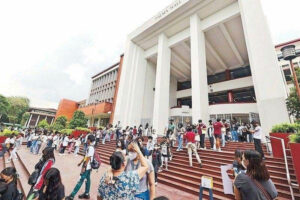By Almira Louise S. Martinez, Reporter
THE practicality of allowing financially capable students of State Universities and Colleges (SUCs) to pay tuition voluntarily is under scrutiny after the University of the Philippines (UP) reported that 10% or less of its students made such payments.
UP President Angelo A. Jimenez noted that in 2024, the university recorded that 10% of its students paid tuition in the first semester and 9% paid in the second semester.
“Very few opted out (of the free SUC tuition scheme) although they are qualified. Many of these are those who exceeded (the duration of their program), or are taking their second degree. There are limits,” he said at a Senate budget hearing.
Mr. Jimenez’s income breakdown for families of UP students was about 50% earning P500,000 a year, with the families of 10% earning more than P1 million. Those with no income records account for 10%.
SUCs offer free tuition under Republic Act 10931 or the Universal Access to Quality Tertiary Education Act. Section 4 of the law requires SUCs, including those backed by local governments, to develop a “mechanism” that enables the financially capable to “voluntarily opt out of the tuition and other school fees subsidy or make a contribution to the school.”
Senator Paolo Benigno A. Aquino IV, one of RA 10931’s authors, said at the hearing on Sept. 27 that he expects UP to take the lead on voluntary payments, because “many students enrolled are financially capable,” and that the premier state university “must be the first to implement an opt-out program.”
“If you drive or have a driver going to UP or Batangas State University, maybe (such students) can opt out,” he said. “The social pressure should be that if you can afford the tuition fee, you should pay it.”
The opt-out “was created for that small set of students who are well-off who are in SUCs, but it should always be voluntary,” he added. “It was not meant to create another set of students who will pay. That’s not the intention of the opt-out provision.”
Youth and student organizations rejected the premise of the opt-out, taking the position that the government must fund public education.
According to Kabataan Party-list, the government can raise “more than enough funds for free, accessible and quality education” if it makes it a priority.
“The government should not be choosing who to give services to,” Kabataan Party-list Rep. Renee Louise M. Co said on Facebook statement. “The government should not pass up its responsibility of ensuring that students and families have access to education.”
“And students should also not have to prove that they are poorer than others to enjoy free education,” she added.
The Student Council Alliance of the Philippines (SCAP) called the implementation of opt-out scheme “problematic.”
“In several SUCs and LUCs, students are pressured to pay tuition before they can enroll, reducing what should be a voluntary option into a coercive practice,” it said.
“This undermines the spirit of the law and risks opening the door back to systems where access to education depends on one’s capacity to pay or endure bureaucratic hurdles,” it added.
Among the private schools, Karel S. San Juan, president of Ateneo de Davao University, said the opt-out can be used to redirect funds to support poor students.
“If the student can fund his or her education, why not use the resources set aside for that student to a poorer student,” Mr. San Juan told BusinessWorld.
“That seems to be an idea worth exploring to make the distribution of educational resources more equitable,” he added.

